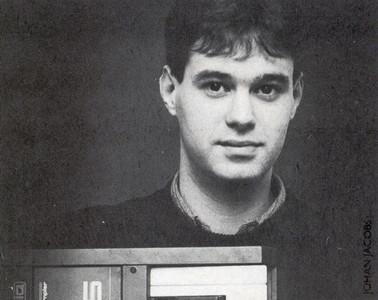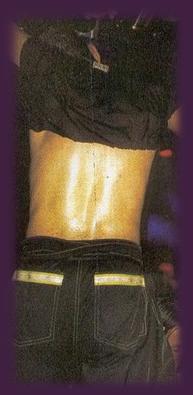 "I've always been interested in dance music. When I was young I already recorded my own tapes, usually mixes of disco- and funk-records. One of those tapes got aired on radio Veronica <a Dutch radio-station>. Afterwards I went to Marc Grouls, who was the DJ at the club BBC in Beveren-Waas <this is not the club with the same name that's currently located in Sint-Niklaas!>. He thought I had talent and that I should try to get one of those mixes out on vinyl. They showed some interest at USA Import in Antwerp and not much later a bootleg got into circulation which had a little piece of my diligent homework. At that time I was seventeen.".
"I've always been interested in dance music. When I was young I already recorded my own tapes, usually mixes of disco- and funk-records. One of those tapes got aired on radio Veronica <a Dutch radio-station>. Afterwards I went to Marc Grouls, who was the DJ at the club BBC in Beveren-Waas <this is not the club with the same name that's currently located in Sint-Niklaas!>. He thought I had talent and that I should try to get one of those mixes out on vinyl. They showed some interest at USA Import in Antwerp and not much later a bootleg got into circulation which had a little piece of my diligent homework. At that time I was seventeen.".
The start of an excellent career - of which there's no doubt at all, according to yours truly, who's still looking for the word "mistaken" totally in vain. The fact that Steve Murphy (23) does extra-ordinary things using a record-player, a tape-recorder and a sampling-machine is for some of you no longer red hot news. More so if you're a visitor of clubs like Dibango in Merchtem or Ritz in Sint-Niklaas (where Steve earns a living as a DJ), or if you're living in the vicinity of Antwerp and occasionally listen to Liaisons Dangereuses on radio-station S.I.S. Mainly because every week that show airs a short New Beat-collage produced by Steve.
Question : Lesson 1, how does one make a good mix ?
Steve : "You have to make sure that the records flow into eachother unnoticable to the listener. I'm not supporting the brute crossovers. Everything needs to go as smoothly as possible for me. To achieve something like that does require a lot of patience though : I once created a mix of about 10 minutes that needed 256 cuts before it was finished. The cut- and pasting of the tape is very time-consuming but neccessary, unless one would own a sampling-machine with an enormous memory <which is of course no longer a problem with even standard PC's nowadays>. To finish the 12-inch
"Dit is Belgisch" (editor's note : a superb mix of all the known New Beat-tracks) I had to work for three full weeks, eight hours a day. In fact it would have been better if I had been able to spend a little more time on it as, even in it's final state, it still had a few minor glitches".
Question : Using the name Men In Progress you've produced your own New Beat-track together with Patrick De Meyer from T-99 (and other projects). Are you two teaming up for future projects as well ?
Steve : "Patrick would like to make another track with me but in future I think it's best to do things on my own. I prefer to work quite fast, while that's impossible to do with Patrick as he's always busy doing six things at once. Patrick is also a schooled musician, something that I'm not. But occasionally he misses one thing or another. For example, there are certain rhythms with which he's not all that familiar while I sense those things much better being a DJ. He also likes to have a lot of variation in a song and doesn't want it to have a mathematical structure all that much. In that area I'm his complete opposite : that kind of structure is an essential part of New Beat. It's about the only thing that both listeners and the DJ are able to get a grip on. That's why I can hear immediately if a certain New Beat-record has been produced by a DJ or not".
Question : Your record as Men In Progress is called "The Bus Trip". I assume there's a good reason for that ?
Steve : "The track is based on the bass-line of the song "The Bus" by Executive Slacks. It's a shame that it has already been used on another record because when it comes to sampling, the originality in New Beat records is hard to find ".
Question : And what are the ambitions of Steve Murphy ?
Steve : "I would like to make it as a producer. I admire people like Arthur Baker and Trevor Horn. For me they are the real innovators".



